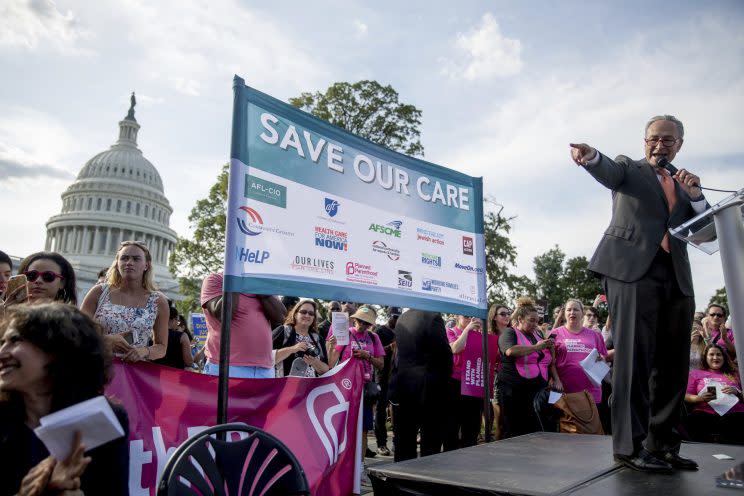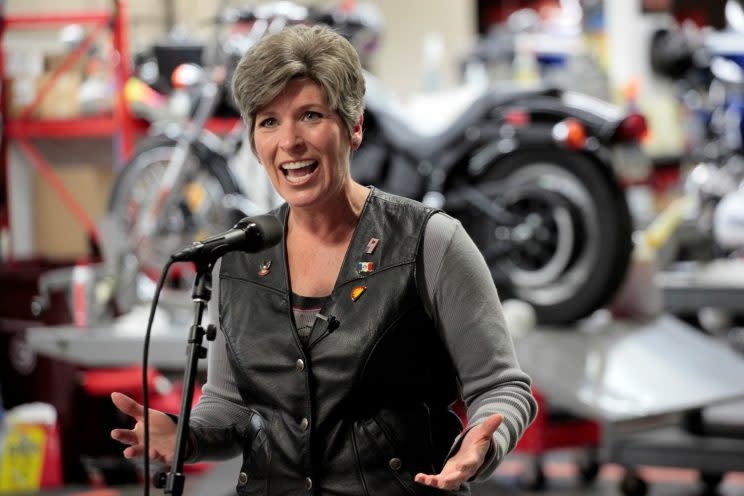Back in session, Senate Republicans weigh starting over with health care bill

Yahoo News’ Health Care Declassified series provides continuing coverage of the Republican efforts to repeal and replace Obamacare. We’ll combine our own reporting with the best insights from around the Internet to give you the latest on the future of health care in America.
Back in Washington after facing sharp criticism at home over their Fourth of July recess, some Senate Republicans have suggested that they’re ready to ditch the embattled Better Care Reconciliation Act and start fresh with new legislation.
“I think my view is it’s probably going to be dead, but I’ve been wrong,” Sen. John McCain, R-Ariz., said of the bill on CBS’s “Face the Nation” Sunday. “I thought I’d be president of the United States. But I think, I think I fear that it’s going to fail. And then we should convene a Republican conference, say, ‘What are we going to do?’ Introduce a bill.”
Other GOP lawmakers have long advocated rewriting their health care plan with help from across the aisle. When announcing that they would not support the BCRA in its current state, Sen. Susan Collins, R-Maine, and Sen. Ron Johnson, R-Wis., both suggested that bipartisan legislation would be their preferred solution.
I want to work w/ my GOP & Dem colleagues to fix the flaws in ACA. CBO analysis shows Senate bill won't do it. I will vote no on mtp. 1/3
— Sen. Susan Collins (@SenatorCollins) June 26, 2017
“Let’s stabilize the markets, then work long term on a bipartisan solution to actually fix the healthcare system,” Johnson said at an event for his constituents.
The current proposal, introduced last month, immediately met resistance due to its deep cuts to Medicaid and tax cuts for high-income Americans. The bill is deeply unpopular with Americans from both ends of the political spectrum, with one poll estimating that only 17 percent support it.
Senate minority leader Chuck Schumer, D-N.Y., has repeatedly expressed interest in working with Senate Republicans on a new draft of health care legislation.
“Democrats are eager to work with Republicans to stabilize the markets and improve the law,” Schumer said in a recent statement.
Despite support from within his party, McConnell has been reluctant to work with Democrats on drafting new health care legislation, after shutting them out of the BCRA’s drafting process.

“My suspicion is that any negotiation with the Democrats would include none of the reforms that we would like to make,” McConnell said last month.
Over the recess, however, McConnell told supporters at a private event in Kentucky that he might be forced to work with Democrats to stabilize Obamacare marketplaces, echoing his promise to work on new bipartisan legislation should his own fail to pass.
“Either Republicans will agree and change the status quo or the markets will continue to collapse and we’ll have to sit down with Senator Schumer,” McConnell said in June.
McConnell is expected to push for a vote on the Better Care Reconciliation Act as it stands later this month. Eleven Senate Republicans have aired doubts about passing the bill in its current state. McConnell can only afford to lose two to maintain the 50 votes needed to pass the bill.
Should he fail to drum up sufficient support for the Better Care Reconciliation Act, several Senate Republicans have suggested pursuing legislation to repeal Obamacare now and working on replacement legislation at a later date as an alternative to starting over with a new draft.
*****
Trump turns up the heat on Congress to pass health care bill

President Trump challenged Congress Monday to pass the long-promised GOP health care plan.
“I cannot imagine that Congress would dare to leave Washington without a beautiful new HealthCare bill fully approved and ready to go!” the president wrote on Twitter.
Congress returned to Washington Monday after the Fourth of July recess but will break again for the month of August, leaving senators with three weeks to pass a health care plan.
Trump also pressed Republicans to repeal and replace the Affordable Care Act earlier this weekend.
“For years, even as a ‘civilian,’ I listened as Republicans pushed the Repeal and Replace of ObamaCare. Now they finally have their chance!” Trump tweeted Sunday.
I cannot imagine that Congress would dare to leave Washington without a beautiful new HealthCare bill fully approved and ready to go!
— Donald J. Trump (@realDonaldTrump) July 10, 2017
— Julia Munslow
*****
GOP senators pour cold water on Cruz health care amendment

Three key Republicans have opposed an amendment to the GOP’s health care bill that would allow insurers to provide coverage that does not comply with the minimum requirements of the Affordable Care Act (ACA).
Sens. Shelley Moore Capito, R-W.Va., Susan Collins, R-Maine, and Chuck Grassley, R-Iowa, criticized the “Consumer Freedom Option” amendment, proposed by Sen. Ted Cruz, R-Texas. Under the amendment, providers could offer plans that do not comply with the Affordable Care Act as long as they also offer some coverage options that do comply with the ACA.
“[Cruz’s] proposal would lead to unaffordable rates for people with pre-existing conditions,” Collins said in a statement. “It would result in the re-imposition of annual caps on how much your insurance will cover, which will be devastating for people who develop or have a chronic, expensive disease to treat.”
Capito echoed Collins’ criticisms, telling the Charleston Gazette-Mail Friday, “I think that reopens an issue that I can’t support, that it would make it too difficult for people with pre-existing conditions to get coverage.”
Grassley raised concerns with the amendment in an interview with Iowa Public Radio last week, calling it “subterfuge to get around pre-existing conditions.” He added, “If it is subterfuge and it has the effect of annihilating the pre-existing condition requirement that we have in the existing bill, than obviously I would object to that.”
Supporters of the amendment said that it would allow healthy individuals to buy insurance with lower premiums.
Collins said that the amendment would call into question whether people with pre-existing conditions could even buy health insurance.
The three Republicans’ criticism of the amendment does not bode well for Senate Majority Leader Mitch McConnell, R-Ky., who risks losing the votes of Cruz and Sen. Mike Lee, R-Utah, if the amendment fails. McConnell needs to secure the support of at least 50 senators to pass the long-promised health care bill. — Julia Munslow
*****
GOP senators suggest poor Americans shouldn’t receive Medicaid

Sen. Joni Ernst, R-Iowa, suggested at a town hall on Monday that poor Americans should be excluded from Medicaid coverage.
Ernest told constituents that she believes Medicaid coverage should only be available to the “elderly, disabled and children,” according to Des Moines Register reporter Jason Noble, who was present.
Asked about Medicaid caps included in BRCA, @SenJoniErnst says she supports Medicaid for "elderly, disabled and children."
— Jason Noble (@jasonnobleDMR) July 10, 2017
Ernest notably omitted low-income Americans from her list.
Sen. Pat Toomey, R-Pa., also advocated cutting Medicaid funding for poor Americans rather than Medicare funding for the elderly in an appearance on MSNBC’s “Morning Joe” on Monday.
When asked by host Joe Scarborough why he wanted to start budget cuts with programs that benefit the poor, Toomey replied, “You got to start somewhere. This is the biggest one. This is the biggest of the problems, Joe.”
The taxpayer-funded Medicaid program has been at the center of the debate surrounding the Better Care Reconciliation Act, which proposes deep cuts to the program, likely to affect care for veterans, Americans who live in rural areas, and those suffering from opioid addictions.
Medicaid, which was introduced in 1965 and expanded by the Affordable Care Act in 2010, was designed to help the poorest Americans get “medically necessary” care such as hospitalization and family planning, in addition to other basic services such as prescription drugs, which vary by state. It is separate from Medicare, which provides health care for elderly Americans regardless of their finances. — Taylor Rogers
*****
Emotional pleas to Congress: Reconsider parts of the health care bill

A former U.S. representative revealed her multiple sclerosis diagnosis in a Friday Washington Post op-ed calling on her former colleagues to maintain health care coverage for those with preexisting conditions.
“I have a preexisting condition simply because I do; and I, like millions of other Americans in the same situation, deserve quality, affordable health care,” former Rep. Donna Edwards wrote.
Edwards, a Democrat, disclosed that she doesn’t know how she’ll pay her nearly $100,000 annual bills for medication and MRI scans without affordable health care.
Edwards, who represented a district in Maryland until leaving the House in 2017, wrote that she is not wealthy, and once almost lost her house when she was saddled with medical bills after a trip to the emergency room.
She touted the Affordable Care Act, noting that while it’s not perfect, it’s a “good start.”
“My MS will not stop me,” Edwards wrote. “But not having health-care coverage because of my MS could stop me permanently. … I pray that as you finish doing whatever it is that you are doing with health care, you remember that I was one of your colleagues, that I worked hard and that I don’t have a preexisting condition because I was a bad person who led an unhealthy life.”
Edwards said that she’s scared of possible consequences of losing her health care, such as losing her home or spending her retirement savings on medication.
Before the enactment of the Affordable Care Act, companies could choose to increase the cost of premiums or deny coverage to those with preexisting conditions. Under the Affordable Care Act, insurance carriers must provide minimum “essential health benefits” such as maternity care and emergency services.
Related slideshow: Protesters across the country oppose GOP’s health care plan >>>
The Senate bill prohibits states from seeking waivers to avoid certain parts of the health care law, but experts say that the rollback of the federal health benefits package and elimination of certain requirements could affect the services covered for people with preexisting conditions, the Washington Post reported. The impact of the bill would ultimately fall to decisions made at a state level, the Post said.
An emergency room physician, Farzon Nahvi, criticized House Speaker Paul Ryan’s push for a free market system in a New York Times op-ed Monday.
Nahvi pointed out that some patients who were unconscious when they arrive in the emergency room wake up “furious” about the costs of their hospitalization — costs that they had no say in.
The physician argued that the patient takes on the role of a consumer, and “must decide whether the goods and services he wants to protect his life are worth the cost.”
Nahvi revealed that he struggled to reconcile wanting to apply his training and compassion with what at least three patients told him: variants of “Thanks for what you’re doing, but I would rather that you hadn’t.”
One patient, who had a brain bleed, told Nahvi that he lacked health insurance but had life insurance, and would have preferred to have died and the payout go to his family.
According to Nahvi, health care cannot be a truly free market because society allows physicians to provide care for those who cannot decide whether they want it.
Ryan has touted the controversial GOP health care plan as enabling the free market.
“We’re going to have a free market, and you buy what you want to buy,” Ryan said in a March radio interview.
Nahvi, however, urged Republicans to let go of the free market fantasy.
“If [Republicans] want medicine to be truly free-market, then they have to be willing to let the next man or woman they find lying unconscious in the street remain there and die,” Nahvi said. “In a truly free market, we cannot treat someone — and charge someone — without their consent and against their will.”
He concluded: “If we believe, however, that those lying there in their most vulnerable moments deserve a shot, then we need to push forward with the idea that health care, at its core, must be designed around a caring system that serves all people fairly.” — Julia Munslow
Read more from Yahoo News:



